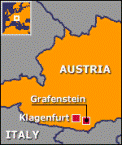In his home province, locals glorify late rightist Haider
 Klagenfurt, Austria - Karin Zloebl started crying when she spoke of Joerg Haider, the late far-right leader who was commemorated Saturday in an elaborate public ceremony in the town of Klagenfurt.
Klagenfurt, Austria - Karin Zloebl started crying when she spoke of Joerg Haider, the late far-right leader who was commemorated Saturday in an elaborate public ceremony in the town of Klagenfurt.
"It is very, very hard," she said about the death of the governor of the Carinthia province, who had personally helped her son find a job.
Like many in this southern Austrian region who attended the memorial service, she remembered the politician as an heroic figure, accepting his anti-immigrant and anti-Muslim policies, and his revisionist view of history.
The provincial governor and national leader of the Alliance for the Future of Austria died October 11 in Klagenfurt at the age of 58. He was driving drunk at a speed of 142 kilometres per hour when his car veered off the road and flipped over several times.
"I always thought, he says exactly what people think," Zloebl said when asked about Haider, who had once called SS veterans "respectable people with character."
Shortly before his death, Haider had sent allegedly criminal asylum seekers off to live in a remote mountain lodge without trial, "to protect the population," as he explained.
"If they do it this way in Austria or Germany, (the politicians) are called racists," even though other countries have similar policies, said Georg Freithofnig, 26.
In the race for Austria's parliamentary elections in late September, the Alliance called for a countrywide ban on building mosques and minarets. Haider's party won 11 per cent of the vote nationwide.
In Carinthia, 39 per cent of the population cast their votes for the Alliance.
"He was our guardian angel," said Gertrude Naber-Ehrlich, an elderly woman dressed in black.
When she was asked against what Haider had protected the region, Naber-Ehrlich didn't have to think twice: "Against the Slovenians who wanted to take away our Carinthia."
The province shares a border with Slovenia. It has a minority of around 50,000 Slovenian speakers in an overall population of 560,000.
Honouring the sentiments of a large part of the population, Haider refused to put up bilingual road signs, as demanded by Austria's constitutional court.
Several people watching the memorial ceremony remembered Haider as a social policymaker who had done much for young mothers and families.
But not everyone in Klagenfurt felt like joining the grand event on Saturday, in which World War Two veterans and far-right student unions took part, along with Austria's political leadership.
"It feels like a soap opera. It's very artificial," said Manuel, 24, the owner of an advertising agency who did not want to see his last name in print.
Although many in the province had opposed Haider, there never had been any public protests in this "secluded, conservative" region, Manuel said in a side street of the town centre.
But most people in Klagenfurt remembered Haider as a politician who had shaken everyone's hand at least once, including that of Sonja Harder, a woman in her 60s.
When she was asked to name one thing she had not liked about Haider, she said: "I can't think of anything right now." (dpa)